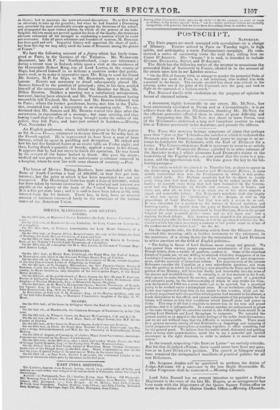The Times this morning betrays symptoms of alarm that perhaps
more than "jinn or fire" Liberals—the number at which it reckoned the DURHAM party on 'Thursday—may be found ready to engage in an at- tempt to reorganize the Reformers, with the Earl of Dtyyousn for a leader. The Conservative organ finds it necessary to recur to an article inn the London and 11 estminster Review, (alluded to in other columns of the Spectator to-day,) which advocates Lord Domain's claims to the leadership of the Popular pal ty,—a sure proof that the scorn is a pre- tence, and the apprehension real. We have given the key to the fol- lowing passage- " The article to which we advert. d on Thursday last, as about to appear in the fortheaming number of the 1.n:ulna and llisfininster Review, is more artfully constructed than waa the Proclamation by which it was profes- sedly idled Ion th. The Durham manifesto had for its object :o Justify every thing that had been (Iona or Intended by its author across the At- Lome ; to damnify ever • thing that had been transacted by the Govern- mint and the Parliament, by friends and enemies here at home; and turns out, after all, to have be is in every one of the above respects signal and memorable ftjltnc. The II, viewer's manifesto dealt also largely in what was meant fm. justification of the designs, as well as the proceedings of Lord ; but that was only a means to an end. It was calculated for a poultice to the torture of hi ti:sed ambition and
festering vanity. It opened wide the gates of Radicalism to the mortified aspirant after despotic sway' ; proclaimed to Lord Durham, Ilene is the proper
hospital for your wounded come and we will nurse you' into a capacity for fresh defeats. But. however neatly adapted to the preparation of this political pis tiller for Lot d Durham, it is to be questioned whether the Re- viewer's article has taken so correct a measure of time public mind as it has of tire weaknesses of that noble E trl." &c. &c. &e.
On the opposite side, the following article from the Glasgow Argus, received this morning, adds a further testimony to the existence, in the provinces, of a strong desire for the restoration of Lord DURHAM to active exertion on the field of English politics- " The feeling in favour of Lord Durham seems strong and general. We have quoted from various papers expressions corroborative of this opinion. Private letters, from a variety of quarters, confirm it. Some of the stanchest friends of Canada are, we see, willing to overlook what they disapprove of in his Lordship's Canadian policy', on account of his recognition of past misgovern- ment, and the necessity of immediate reform. The majority even of the earnest Reformers consider the Canadian as a vety subordinate question; and trust that the position in which his Lordship is now placed to the Peers and the timid portion of the Ministry, will force hint finally and irrevocably into the arms of the sincere and decided Liberals. It certainly is at this moment in his Lord- ship's power to make himself the nucleus and aninisting spirit of a powerful and energetic party, by the instrumentality of which he may render his Glas- gow declaration of 1834 nut a mere mentriot to ire sported, but a practical policy to be worked out to a triumphant issue. If—as we believe—tire Bowlby Letter was impetrated from him on his return to this country, while yet stn perfectly acquainted with the position which parties had assumed in bis absences frank declaration to this effect, and earnest enforcement 01 his principles for the future, will restore to him that confidence which himself alone had power to shake. This step is all that is requisite to restore him to his true and proud position—but it is indispensable. In a recent number we endeavoured to place in the same strong light we ourselves viewed it, the difficulty there would be in getting Lord Durham and Lord Brougham to cooperate. We intended the picture mainly as an appeal to the better feelings of the noble lords themselves; and we are not without hope that the difficulty is surmountable. There must be a general amnesty among all real Reformers—a forgetting and unsaying of harsh judgments and reproaches—a banding together, to effect something real for the general good. We believe that the public mind, distracted and gadding after so many state quackoloctora, needs but to see a powerful and decided movement iu the right direction, in order to reclaim it to sound and sane action."
In the remark respecting " the BOWLRY Letter" we entirely coincide. But for that ill-judged effusion, there would never have been any ques- tion as to Lord DURHAM'S position. The speech at Glasgow would have remained the unimpeached manifesto of practical politics for all real Reformers.


























 Previous page
Previous page